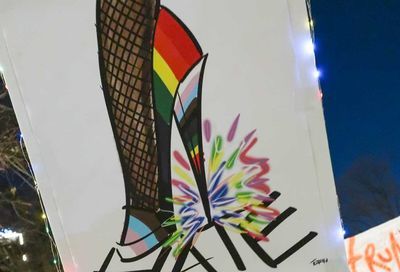LGBTQ Employees More Likely to “Change Their Personality” at Work
Study finds LGBTQ people are more likely than their heterosexual counterparts to conceal their identity in the workplace.

A new study finds that LGBTQ workers are more likely to “change” their personalities, or adjust how they present themselves to their employers and fellow co-workers in the workplace, for a host of different reasons.
The study, conducted by JobSage, an employee transparency platform that partners with employers to provide information on companies’ workplace environments to jobseekers, surveyed 1,932 people from March 15-16, asking employees about the difference between their “home personality” and their “work personality.”
While the study showed that most of the respondents are “hiding something” from people at their place of work, overwhelmingly, LGBTQ workers feel as though they have to adjust their personalities while at work.
The study found that 85 percent of LGBTQ respondents “have a different personality while at work” while only 64 percent of heterosexual respondents reported a similar experience.
Eighty percent of LGBTQ respondents stated they were “hiding something from their employer;” a number that far exceeds the 56 percent of heterosexual respondents who responded similarly.
The difference between LGBTQ people’s and heterosexual people’s experience at work only continues to widen when looking who has to “expend energy repressing their identity while at work.” In this category, an overwhelming 97 percent of LGBTQ respondents answered affirmatively, compared to 80 percent of heterosexual respondents.
The study also revealed that when LGBTQ employees are “authentic while at work,” they are more likely to be treated differently. Eighty percent of LGBTQ respondents stated they recieved different treatment while being “authentic” at work, compared to just 56 percent of heterosexual respondents.
LGBTQ employees may be more reticent to be open about their personal lives at work due to the current atmosphere, in which merely acknowledging one’s LGBTQ identity may be seen as a “political” act or engender backlash from those with anti-LGBTQ animus.
In recent years, lawmakers in various states have either passed or introduced bills aimed at restricting the rights of, or negatively impacting, LGBTQ individuals. Examples of such legislation include bills to prevent teachers from talking about LGBTQ issues in schools, bar transgender women from participating in women’s sports, or prosecute the parents and doctors of transgender youth who receive gender-affirming medical care.
LGBTQ people may also be reticent to be authentically “out” in the workplace due to fear of physical harm. Instances of anti-LGBTQ violence appear to be trending upward, with the number of murders claiming the lives of transgender people increasing with each passing year, and reports of anti-LGBTQ attacks occurring more frequently in the months since many cities lifted their COVID-19 restrictions on social distancing.
As a result of these extenuating circumstances, it is reasonable to see why some LGBTQ people might be concerned about how their identity would be perceived by others, and thus alter their behavior in professional situations.
Support Metro Weekly’s Journalism
These are challenging times for news organizations. And yet it’s crucial we stay active and provide vital resources and information to both our local readers and the world. So won’t you please take a moment and consider supporting Metro Weekly with a membership? For as little as $5 a month, you can help ensure Metro Weekly magazine and MetroWeekly.com remain free, viable resources as we provide the best, most diverse, culturally-resonant LGBTQ coverage in both the D.C. region and around the world. Memberships come with exclusive perks and discounts, your own personal digital delivery of each week’s magazine (and an archive), access to our Member's Lounge when it launches this fall, and exclusive members-only items like Metro Weekly Membership Mugs and Tote Bags! Check out all our membership levels here and please join us today!























You must be logged in to post a comment.